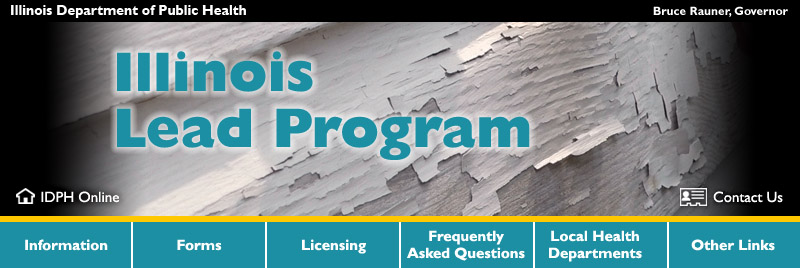
Lead Program Frequently Asked QuestionsWhat is lead poisoning?Lead poisoning is too much lead in the body. Lead is especially harmful to the small bodies of children younger than 6 years of age. Many children throughout the United States are exposed to lead. Lead is a toxic chemical; no safe level of lead in the body has been able to be determined. Current research indicates that adverse outcomes may occur at less than or equal to 10 µg/dL. What can I do to protect my child from lead exposure?The only way to prevent damage from lead is to prevent exposure to lead. Learn if you have lead in your home. If your home was built before 1978 or you do not know when your home was built, assume it has lead. Before you sign a lease, ask the landlord about lead. Before you buy a home, have it inspected for lead. Lead gets into dust and dirt. Children eat lead by getting it on their hands and toys and then putting them in their mouths. Wash your children’s hands before they eat. Damp clean all horizontal surfaces often including floors and window sills. What damage is done by lead?Lead in the body is not safe at any level. Even very small amounts of lead can permanently damage the brain as it develops. Lead makes it harder for the child to learn and causes behavior problems. How can I tell if my child has lead poisoning?Most children who get lead in their body do not have any physical symptoms. Your child may have lead poisoning and not be sick. The only way to tell if your child has lead poisoning is to have a blood lead test performed by your health care provider. To find out how to test your child, talk to doctor or your local health department. Can lead affect my unborn child?Lead stored in your body can be released from your bones and passed to your unborn child. Possible effects on your unborn child may include:
Sometimes pregnant women have the urge to eat nonfood items such as clay, pottery or dirt. Women should avoid eating non-food items during pregnancy. Women planning to have a baby should be tested if they have an increased level of exposure to lead. Women who have had lead poisoning in the past should discuss their medical history with their doctor during their first visit. Is it safe to breast feed my baby if I have an elevated blood lead?Recent studies indicate that there is little transfer of lead to the infant in breast milk. It is recommended that a new mother continue to breastfeed if the mother’s blood lead level is less than 40 µg/dL. When should a healthcare provider test a child?
As a healthcare provider, am I required to report all blood lead tests?Every physician who diagnoses, or a nurse, hospital administrator or public health officer who has verified information of the existence of any person found or suspected to have a level of lead in the blood in excess of the permissible limits set forth in regulations adopted by the Department, within 48 hours of receipt of verification, shall report to the Department the name, address, laboratory results, date of birth, and any other information about the person deemed essential by the Department. Directors of clinical laboratories must report to the Department, within 48 hours of receipt of verification, positive results of all blood lead analyses performed in their facility. The information included in the clinical laboratories report shall include, but not be limited to, the child’s name, address, date of birth, name of physician ordering analysis, and specimen type. All negative results must be reported to the Department in accordance with rules adopted by the Department. These rules shall not require reporting in less than 30 days after the end of the month in which the negative results are obtained. Note: This includes reporting all venous and finger stick screening, diagnostic and follow-up tests. You may use the Department’s blood lead reporting form if you have not arranged to report electronically to the Department.
|